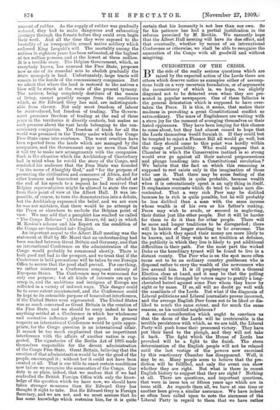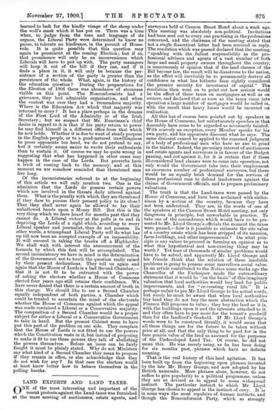CURIOSITIES OF THE CRISIS.
BY the side of the really serious questions which are raised by the expected action of the Lords there are others which deserve notice as examples either of assump- tions built on a very uncertain foundation, or of arguments the inconsistency of which is, we hope, too slightly disguised not to be detected even when they are pre- sented in popular newspapers. One of these fallacies is the general detestation which is supposed to have over- taken the Peers. It is this, it seems, that makes their madness in provoking a great Constitutional conflict so extraordinary. The mass of Englishmen are waiting with a stern joy for the moment of avenging themselves on their hated oppressors. They have been longing for this chance to come about, but they had almost ceased to hope that the Lords themselves would furnish it. If they could but be tempted to reject a Finance Bill all would go well, but that they should come to this point was hardly within the range of possibility. Who could suppose that a Chamber in which the Conservative instinct is so strong would ever go against all their natural prepossessions and plunge headlong into a. Constitutional revolution ? We believe that the fact on which this reasoning is supposed to rest exists only in the imagination of those who use it. That there may be some feeling of the kind against wealth is quite probable, because wealth when it is ostentatiously spent is an ugly thing in itself. It emphasises contrasts which do tend to make men dis- contented. That a very rich Peer may be disliked because he is rich is quite possible, but he will probably be less disliked than a man with the same income whose wealth is of his own or his father's making. Peers may wish to evade, or succeed in neglecting, their duties just like other people. But it will be harder for them to do it than for other people. There will be more and longer traditions to be disregarded ; there will be habits of longer standing to be overcome. The ways in which they spend their money are more likely to be known, and if they wish to set tradition at defiance, the publicity in which they live is likely to put additional difficulties in their path. For the most part the wicked Duke or the hereditary tyrant will be found to live in a distant county. The Peer who is on the spot more often turns out to be an ordinary country gentleman who is disposed rather to envy the wealth of the newcomers who live around him. It is ill prophesying with a General Election close at hand, and it may be that the polling stations will be thronged by voters eager to gratify a long- cherished hatred against some Peer whom they know by sight or by name. If so, all will no doubt go well with the assailants of the Lords. But what if the diagnosis of Liberal politicians and Liberal journalists proves incorrect, and the average English Peer turns out to be liked or dis- liked to much the same extent, and for much the same reasons, as his untitled neighbours ?
A second consideration which ought to convince us that the doom of the Lords will be irretrievable is the terrible persistence with which, as we are told, the Liberal Partfwill push home their presumed victory. They have put their hand to the plough, and they will not take it back. The fight which the House of Lords has provoked will be a fight to the finish The stem determination of the English people will not be relaxed until the last vestige of the powers now exercised by this reactionary Chamber has disappeared. Well, it may be so. Many people seem to believe that the pre- diction will be fulfilled, and only the event can show whether they are right. But what is there in recent English history to suggest that they are right ? Nothing at all. There are questions, and important questions, that were in issue ten or fifteen years ago which are in issue still. As regards them all, we have at one time or another been given a similar assurance. We have indeed so often been called upon to note the stoniness of the 'Liberal Party in regard to them that we have rather learned to look for the kindly visage of the sheep under the wolf's mask which it has put on. There was a time when, to judge from the tone and language of its organs, the Liberal Party were determined to know no pause, to tolerate no hindrance, in the pursuit of Home- rule. It is quite possible that this question may again be prominent at the coming Election ; but if so, that prominence will only be an inconvenience which Liberals will have to put up with. The party managers will keep it out of the bill if they can, and if it finds a place in it, it will only be because the per- sistence of a section of the party is greater than the persistence of the whole. What, again, is the history of the education question ? During the preparations for the Election of 1906 there was abundance of sternness visible on this point. The Nonconformists had a grievance, they had admirable organisation, and when the contest was over they had a tremendous majority. Where is the Education Act which that majority was returned to carry ? It has a place perhaps in the dreams of the First Lord of the Admiralty or of the Irish Secretary ; but we suspect that Mr. Runciman's chief desire in regard to it is that if his party return to power he may find himself in a different office from that which he now holds. Whether it is due to want of steady purpose in the English people, or to a good-natured unwillingness to press opponents too hard, we do not pretend to say, but it certainly seems easier to excite their enthusiasm than to sustain it. Of course we may be quite wrong in suggesting that what has happened in other cases may happen in the case of the Lords. But proverbs have a trick of coming back to the memory, and at this moment we are somehow reminded that threatened men live long.
Of the inconsistencies referred to at the beginning of this article we will only mention two. One is the admission that the Lords do possess certain powers which are involved in the threats daily uttered against them. What is the penalty with which they are threatened if they dare to pursue their present policy to its close ? That they shall never again be allowed to lay their unhallowed hands upon a Money Bill. But this is the very thing which we have heard for months past that they cannot do. A Liberal victory at the polls is to end in depriving the Lords of a right which, according to every Liberal speaker and journalist, they do not possess. In other words, a triumphant Liberal Party will do what has up till now been an accepted example of an impossibility. It will succeed in taking the breeks off a Highlander. We shall wait with interest the announcement of the formula by which this feat will be accomplished. The second inconsistency we have in mind is the determination of the Government not to touch the question really raised by their present declarations. They tell us again and again that the House of Lords is a bad Second Chamber,— that it is not fit to be entrusted with the power of asking the electors whether a House of Commons elected four years ago still retains their confidence. We have never denied that- there is a certain amount of truth in this charge. We should like to see a Second Chamber equally independent of both parties, a Chamber which could be trusted to ascertain the mind of the electorate whether the House of Commons against which the appeal was made contained a Liberal or a Conservative majority. The composition of a Second Chamber would be a proper subject for either. a Liberal or a Conservative Government to take in hand. But the present Cabinet seem to have put this part of the problem on one side. They complain that the House of Lords is not fitted to use the powers -which the Constitution vests in it, but instead of proposing to make it fit to use these powers they talk of abolishing the powers themselves. Before an issue can be fairly fought it must be plainly stated. Why do not Ministers say what kind of a Second Chamber they mean to propose if they remain in office, or else acknowledge that they do not wish for any ? In that case the electors would at least know better how to behave themselves in the polling booths.















































 Previous page
Previous page